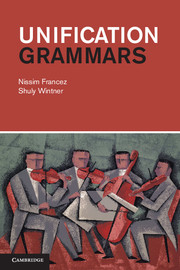Book contents
- Frontmatter
- Contents
- Preface
- Acknowledgments
- 1 Introduction
- 2 Feature structures
- 3 Unification
- 4 Unification grammars
- 5 Linguistic applications
- 6 Computational aspects of unification grammars
- 7 Conclusion
- Appendix A List of symbols
- Appendix B Preliminary mathematical notions
- Appendix C Solutions to selected exercises
- Bibliography
- Index
5 - Linguistic applications
Published online by Cambridge University Press: 25 October 2011
- Frontmatter
- Contents
- Preface
- Acknowledgments
- 1 Introduction
- 2 Feature structures
- 3 Unification
- 4 Unification grammars
- 5 Linguistic applications
- 6 Computational aspects of unification grammars
- 7 Conclusion
- Appendix A List of symbols
- Appendix B Preliminary mathematical notions
- Appendix C Solutions to selected exercises
- Bibliography
- Index
Summary
We developed an elaborate theory of unification grammars, motivated by the failure of context-free grammars to capture some of the linguistic generalizations one would like to express with respect to natural languages. In this chapter, we put the theory to use by accounting for several of the phenomena that motivated the construction. Specifically, we account for all the language fragments discussed in Section 1.3.
Much of the appeal of unification-based approaches to grammar stems from their ability to a account for linguistic phenomena in a concise way; in other words, unification grammars facilitate the expression of linguistic generalizations. This is mediated through two main mechanisms: First, the notion of grammatical category is expressed via feature structures, thereby allowing for complex categories as first-class citizens of the grammatical theory. Second, reentrancy provides a concise machinery for expressing “movement,” or more generally, relations that hold in a deeper level than a phrase-structure tree. Still, the formalism remains monostratal, without any transformations that yield a surface structure from some other structural representation.
Complex categories are used to express similarities between utterances that are not identical. With atomic categories of the type employed by context free grammars, two categories can be either identical or different. With feature structures as categories, two categories can be identical along one axis but different along another.
- Type
- Chapter
- Information
- Unification Grammars , pp. 165 - 212Publisher: Cambridge University PressPrint publication year: 2011

